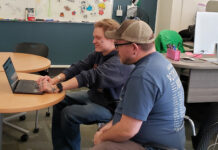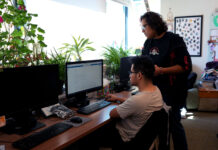This story is jointly published as part of the Utah College Media Collaborative, a cross-campus project bringing together emerging journalists from Salt Lake Community College, Southern Utah University, the University of Utah, Utah Tech University and Weber State University. The collaborative is an Amplify Utah project with support from PBS Utah.

Sitting on my cold dorm room floor the Sunday before spring semester began — still in my pajamas — I finally had to face procrastinating work, especially submitting a pitch for the Utah College Media Collaborative.
I needed to come up with an idea that explored Generation Z’s relationship with mental health and technology. Instead, I opened TikTok. As I scrolled, I kept seeing memes about Luigi Mangione, the 26-year-old man arrested for the murder of UnitedHealthcare CEO Brian Thompson just weeks before.
Then it hit me.
As the editor-in-chief of Sun News Daily, I decided to pitch a story about Gen Z’s dark humor online.
Being part of Gen Z forced me to confront my own view on this brand of humor and my relationship with technology. As I reflected on my social media use, I realized I had grown to depend on it to distract myself from feelings of anxiety.
My first introduction to technology was the computer lab at my small-town elementary school. I can’t remember a time during my school years without having access to a phone or computer. Even as early as first grade, I was constantly interacting with media through the internet.
Then, in junior high, I caught the social media bug. The first social media platform I had was Pinterest, if you even consider that social media. Next was Snapchat, then Instagram, and eventually, TikTok.
I grew up with social media, something previous generations haven’t experienced. Millennials had Myspace and Facebook, but that was when social media was new and upcoming — it still had its luster. It hadn’t hit the point of toxicity that it holds now, and it wasn’t something that had a chokehold on young adults.
Sure, social media has positives, but it’s a double-edged sword. You have to take the good with the bad – and studies show there’s a whole lot of bad. While I love all of the funny TikToks I have saved, social media has done more harm than good for me.
Our story for the Utah College Media Collaborative unfolds Gen Z humor and delves into the mental health challenges this generation is currently facing.
For some, dark humor online is a way to cope with mental health challenges. It can be an escape from reality that offers a level of relief. Yet, I cannot ignore all the downsides of social media. I don’t blame social media for my mental health challenges, but it certainly hasn’t helped.
I’m in a constant state of comparing myself to others and feeling I’m never good enough. I can’t be the best editor-in-chief because I’m always looking at other news organizations’ incredible work. Or, I can’t possibly be attractive enough for someone to date because there are all these beautiful women out there, far more pretty than I am.
The feelings of anxiety I have are always made worse by scrolling through social media. I’m spammed with political issues or news of illnesses and natural disasters I have no control over. It’s not healthy for me to see a spam of these things because, even if they are true, I start to obsess over them, throwing me into an anxiety-driven spiral.
While it’s nice we have our funny little videos on social media, there’s a bigger picture here and a bigger problem — a large portion of Gen Z is suffering from mental health challenges, and technology has only made it worse.
Yes, Gen Z’s online humor is fun, and I also get a good laugh from scrolling on TikTok, but I have to start distancing myself from social media.
While the collaboration started as a project for Sun News to participate in, it quickly turned into a moment of self-reflection. I realized I rely too much on social media to help “cure” my worries when that’s not how worries are cured. Social media has been a quick-fix distraction that leaves me with more feelings of anxiety than I had without it.
My lesson is this — I can’t rely on social media to ease my mind. I cannot rely on something that is materialistic. All these funny videos we have are just — videos. They aren’t life-changing, and they won’t provide a long-lasting coping mechanism.
So, I urge my fellow Gen Zers to take a step back and examine how you use social media in your own lives. Is it really helping with your worries, or just distracting you for a little while?
Lexy Borgogno reported and produced this story as a digital media student at Utah Tech University.






